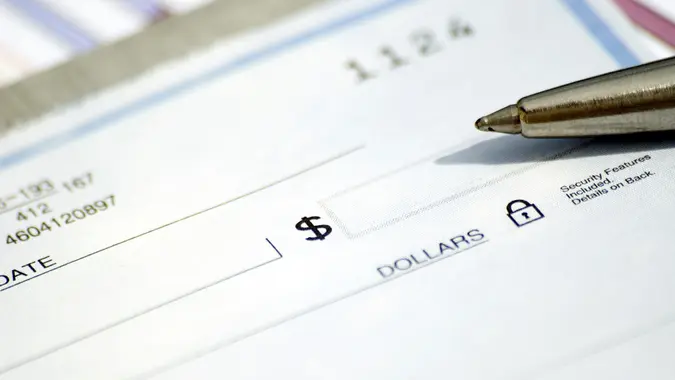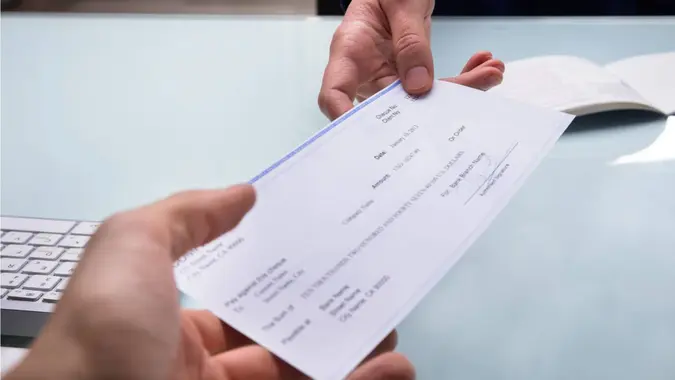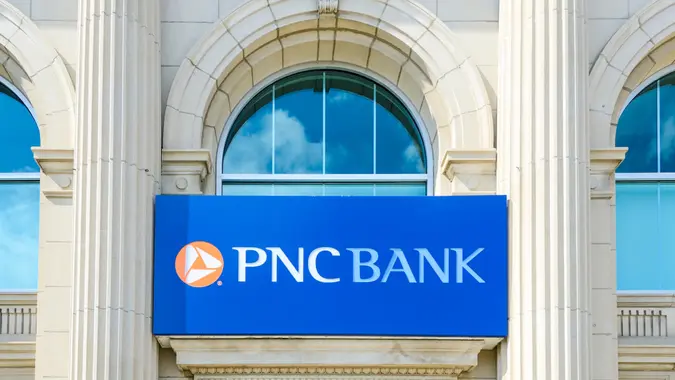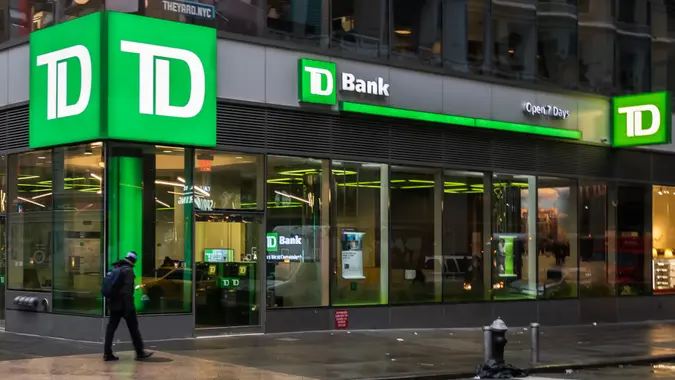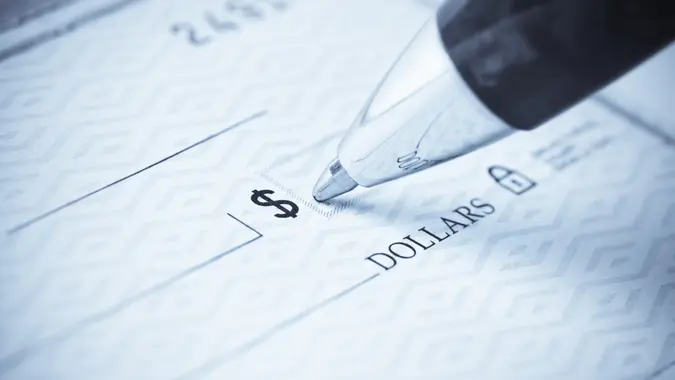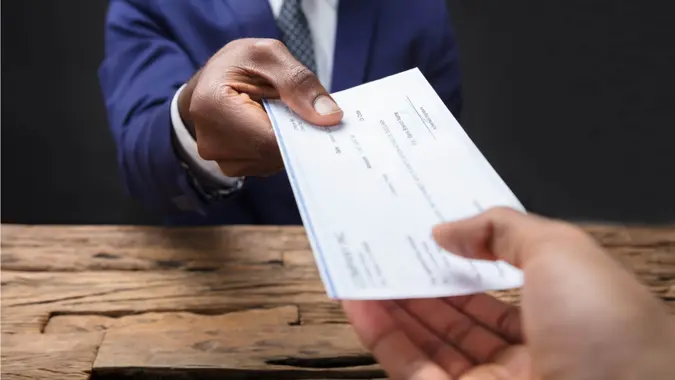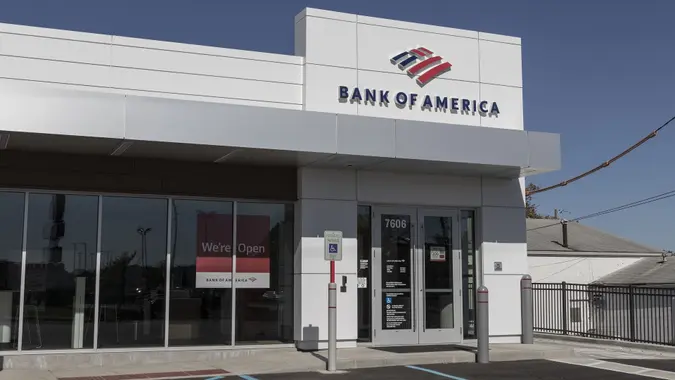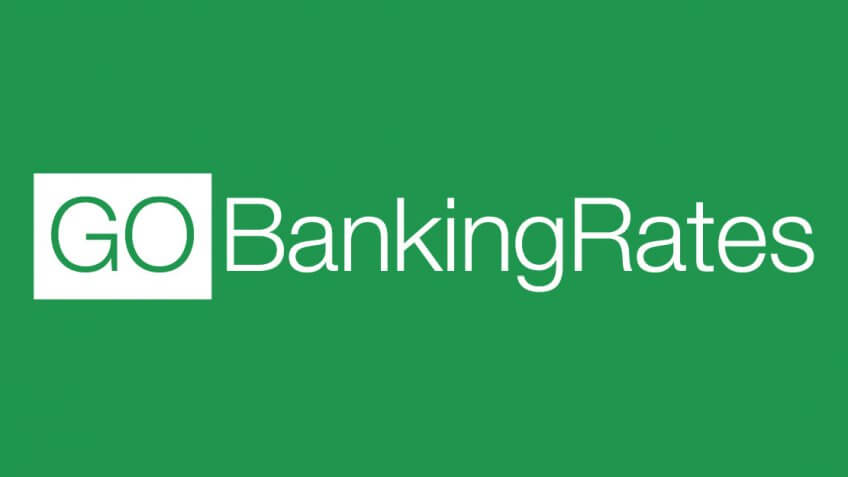What Is a Bounced Check? How To Prevent Them

Commitment to Our Readers
GOBankingRates' editorial team is committed to bringing you unbiased reviews and information. We use data-driven methodologies to evaluate financial products and services - our reviews and ratings are not influenced by advertisers. You can read more about our editorial guidelines and our products and services review methodology.

20 Years
Helping You Live Richer

Reviewed
by Experts

Trusted by
Millions of Readers
When your check bounces, it means the recipient’s bank didn’t accept your check because you didn’t have enough money in your account. The bank will return the bounced check to the payee — the person the check was made out to.
The term predates digital banking, but it applies to electronic payments as well. An electronic payment can be treated like a bounced check if you don’t have sufficient funds to cover the transaction amount.
How Does a Check Bounce?
There are several reasons why a check bounces. Those reasons might be:
- Insufficient funds: Your account doesn’t have enough funds to cover the amount of the check.
- Closed account: The check is written from an account that is closed.
- Stop payment instructions: The check issuer requests that the bank not process the check.
- Incorrect information: If the check has mismatched words and amount, the check may bounce.
- Postdated check: If the check is written for a future date, the bank may refuse to cash or deposit the check.
- Stale check: If the check is too old to process (typically six months after the issue date), the bank may refuse to honor the check.
- Wrong endorsement: The payee’s name is missing, incorrect or doesn’t match the name of the check.
How Long Does It Take for a Check to Bounce?
Most bounced checks are identified between one to five business days, but it may take longer in certain circumstances.
- Local checks: Most businesses process checks in one to two days. Sometimes it may take a bank up to five business days to fully process a check and identify that it has insufficient funds.
- Non-local or out-of-state checks: It could take up to five to seven business days.
- International checks: Processing international checks could take up to seven to 30 days due to currency exchanges and verification procedures.
What Happens If a Check Bounces?
There is an impact on both the issuer and recipient of a bounced check.
If you issued the bounced check, expect the following:
- Insufficient fund fee. Your bank will charge you an insufficient fund fee that could range from $25 to $40.
- Overdraft protection fee. If you have overdraft protection and it covers the check, the bank may still charge a fee.
- Funds are left unpaid. Since the check didn’t go through, the debt is still outstanding.
- The recipient of the check is notified. The recipient won’t receive their funds and that may cause issues for you.
If you receive the bounced check, the following may happen:
- Returned check notification. The bank will inform you that your check could not be processed.
- Return check fee. You may be charged a fee for depositing a bounced check, typically $10-$20.
- Delay in receiving your funds. You will not receive your payments timely.
- You may contact the issuer. Contact the issuer and let them know the check bounced.
What Is a Non-Sufficient Funds Notification?
If you receive an NSF notification, it will include:
- The amount of the check
- Date of the attempted transaction
- Statement indicating the account had insufficient funds
- Instructions on resolving the issue
- Details about NSF or overdraft fees applied
Generally the issuer’s bank will inform the check writer about the bounced check and the associated fees. The recipient’s bank provides the payee with the returned check notification and may charge a fee for the failed deposit.
Do I Have to Pay a Fee If I Bounce a Check?
A bounced check has fees from banks and merchants.
Here are some of the typical fees charged by banks:
- NSF fee: The fee from the bank ranges from $25 to $40.
- Overdraft protection fee: If you have overdraft protection on your account, the fee ranges from $25 to $35.
- Daily overdraft fees: Some banks may charge a daily overdraft fee. These range from $5 to $15 a day.
Here are merchant fees you may also pay:
- Merchant fees. Some merchants may charge a fixed fee for bounced checks. The range can be between $20 to $50.
- State-mandated penalties. Some states allow merchants to impose statutory penalties on bounced checks. It could be a fixed fee or a percentage of the check amount.
- Legal fees. If a merchant decides to sue you in court, you may be responsible for legal fees.
How To Minimize Fees With Your Bank
There may be ways to minimize your fees with your bank. Following these tips may help prevent or reduce fees on bounced checks:
- Set up overdraft protection. Link your checking account to a credit line or savings account to help with shortfalls.
- Turn on account alerts. Receive automatic notifications if your account balance is low.
- Monitor your account regularly. Check your balances and pending checks regularly to avoid bouncing a check.
- Avoid floating checks. Write checks you know will clear your account.
Bounced Check Consequences
Bouncing a check can have numerous negative consequences. Let’s take a look at three different scenarios:
Bounced Checks on Closed Accounts: What To Know
When you write a check from a closed account, there are financial and legal repercussions:
- Immediate rejection. The bank will immediately reject your check.
- Legal consequences. A check written on a closed account is considered fraudulent. You may receive civil and criminal penalties.
- Financial penalties. Some banks may charge a fee even if the account is closed. There may also be collection costs associated with the bounced check.
- Damage to financial standing. You may be reported to the consumer reporting agencies, and it could impact your credit report.
Bounced Checks and Impact on Your Credit Score
Banks typically do not report bounced checks to credit bureaus, so a single NSF fee will not impact your credit score. However, there are indirect impacts to your credit in the following ways:
- Collection agency. If the bounced check represents a payment like rent, utilities or a loan repayment and the debt remains unpaid, the recipient may forward it to a collection agency. Once in collections, it may be reported to the credit bureau.
- Legal judgments. If the payee sues for the bounced check and there is a judgment against you, it may show up on your credit report and lower your score.
- Late payments. If your bounced check causes an overdraft or unpaid fees on a linked credit line, late payments on those accounts could be reported to credit bureaus.
What To Do If You Bounce a Check
If you’re the issuer of the bounced check, you may be wondering what to do to handle the situation appropriately. Here are few tips on what to do after learning you wrote a bounced check:
- Identify the problem. Check with your bank on why the check bounced.
- Deposit sufficient funds. Immediately add enough money to your account to cover the bounced check and any fees.
- Contact the payee. Explain the situation to the payee and apologize. Let them know how you plan to reissue payment.
- Cover all associated fees. Pay the NSF fee charged and avoid letting more fees accumulate.
What Happens If You Cash a Check That Bounces?
There will be delay in getting your money. If the check bounced due to insufficient funds, you may redeposit it after verifying with the issuer that sufficient funds are now available. You cannot redeposit a bounced check if a stop payment was issued or if the account is closed.
How To Recover Your Funds If Your Check Bounces
As a payee, you want to be paid. Here are few steps to take to recover those funds:
- Contact the issuer. Notify the issuer of the bounced check and ask why it occurred. Also ask when you will be paid.
- Request a secure method of payment. Ask for cash, cashier’s check or electronic transfer to avoid another bounced check situation.
- Invoice the issuer any fees assessed because of the bounced check. If you were charged a return fee by your bank, send an invoice to the issuer.
- Send a demand letter. For larger amounts, send a demand letter.
- Seek legal help. If the issue is not resolved by contacting the issuer, consider getting an attorney.
Alternatives to Writing Checks
Instead of dealing with checks, there are other forms of payment that are secure and faster. Some of these payment options include the following:
- Payment apps like Zelle, Venmo and PayPal
- Debit cards
- Bank transfers, such as wire and ACH transfers
- Digital wallets like Apple Pay, Google Pay and Samsung Pay
Are Digital Wallets a Better Option?
There are advantages of digital wallets because there is enhanced security, convenience, and speed of the transaction. The drawbacks are not all merchants accept digital wallets, and not everyone is comfortable with the learning curve associated with using a digital wallet.
How To Avoid Bounced Checks
It’s in your best interest to avoid bouncing a check. Here are some tips to avoid bouncing a check:
- Set up a financial cushion. Keep a buffer amount for unexpected expenses and accounting errors.
- Avoid postdating checks. Avoid writing checks dated in the future. Only write checks when funds are immediately available.
- Set up overdraft protection. You can have your bank transfer the overdraft amount from a linked savings, a money market account or a credit card.
- Enable account alerts. Set up an alert on your phone that notifies you of an unusually low balances on your account.
- Monitor your balances. Regularly check for debits, pending checks, and account balances on all accounts.
Bounced Check FAQ
See answers to some of the most frequently asked questions about bounced checks.- Why do checks bounce?
- Checks can bounce for multiple reasons including insufficient funds, stop payment, stale and postdated checks and incorrect endorsements.
- Can you redeposit a bounced check?
- Yes, once your bank returns the bounced check to the payee, the person to whom you wrote the check can still attempt to get their money using that same check. The check would bounce again if the payor had not straightened out their account.
- How long does it take to resolve a bounced check issue?
- Resolving a bounced check issue can take anywhere from a few days to several weeks, depending on the specific circumstances. It's best to speak with your bank so you know exactly all of the steps and the timeline involved.
- What happens if you bounce a check repeatedly?
- The bank will charge you overdraft fees and insufficient fund fees, and your account may be closed. It may likely impact your credit and banking history.
Andrea Norris and Emily Cahill contributed to the reporting for this article.
Our in-house research team and on-site financial experts work together to create content that’s accurate, impartial, and up to date. We fact-check every single statistic, quote and fact using trusted primary resources to make sure the information we provide is correct. You can learn more about GOBankingRates’ processes and standards in our editorial policy.
- Consumer Finance Protection Bureau. "ChexSystems, Inc."
- Consumer Finance Protection Bureau. "I bounced a check. Will this show up on my credit report?"
- United States Postal Inspection Service. "Check Fraud"
- Code of Virginia "§ 18.2-181. Issuing bad checks, etc., larceny."
 Written by
Written by  Edited by
Edited by 



